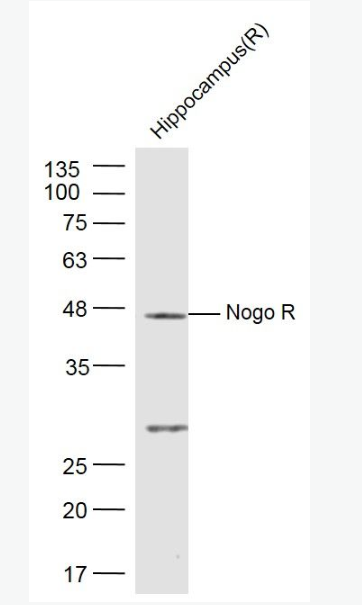| 中文名稱 | 軸索過度生長抑制因子受體/Nogo受體抗體 |
| 別 名 | NgR; Nogo-66 receptor; Nogor; NogoR; Nogo-R; Reticulon 4 receptor; Rtn4r; RTN4R_RAT. |
| 研究領(lǐng)域 | 神經(jīng)生物學 |
| 抗體來源 | Rabbit |
| 克隆類型 | Polyclonal |
| 交叉反應 | Mouse, Rat, |
| 產(chǎn)品應用 | WB=1:500-2000 ELISA=1:500-1000 IHC-P=1:100-500 IHC-F=1:100-500 IF=1:100-500 (石蠟切片需做抗原修復) not yet tested in other applications. optimal dilutions/concentrations should be determined by the end user. |
| 分 子 量 | 48kDa |
| 細胞定位 | 細胞膜 |
| 性 狀 | Liquid |
| 濃 度 | 1mg/ml |
| 免 疫 原 | KLH conjugated synthetic peptide derived from mouse Nogo R:151-350/473 |
| 亞 型 | IgG |
| 純化方法 | affinity purified by Protein A |
| 儲 存 液 | 0.01M TBS(pH7.4) with 1% BSA, 0.03% Proclin300 and 50% Glycerol. |
| 保存條件 | Shipped at 4℃. Store at -20 °C for one year. Avoid repeated freeze/thaw cycles. |
| PubMed | PubMed |
| 產(chǎn)品介紹 | Axons are essential for neuronal communication but they do not regenerate after injury to the adult mammalian brain or spinal cord. Failed regeneration is due in part to the production of a potent axonal growth inhibitor, Nogo, by myelinating cells. The finding of a high affinity axonal receptor for the extracellular domain of Nogo provides the first insight into the basis of Nogo action. Disrupting the interaction of Nogo with the Nogo-66 receptor may facilitate axonal regeneration in vivo. The protein is dubbed the Nogo receptor because it binds with several other proteins that block neural growth. It is found to be ubiquitous in the brain and spinal cord. Function: Receptor for RTN4, OMG and MAG. Mediates axonal growth inhibition and may play a role in regulating axonal regeneration and plasticity in the adult central nervous system. Acts in conjunction with RTN4 and LIGO1 in regulating neuronal precursor cell motility during cortical development (By similarity). Subunit: Homomultimer. Interacts with LINGO1. Interacts with KIAA0319L. Subcellular Location: Cell membrane; Lipid-anchor, GPI-anchor. Similarity: Belongs to the Nogo receptor family. Contains 8 LRR (leucine-rich) repeats. Contains 1 LRRCT domain. Contains 1 LRRNT domain. SWISS: Q99PI8 Gene ID: 65079 Database links: Entrez Gene: 65078 Human Entrez Gene: 65079 Mouse Entrez Gene: 113912 Rat Omim: 605566 Human SwissProt: Q9BZR6 Human SwissProt: Q99PI8 Mouse SwissProt: Q99M75 Rat Unigene: 30868 Human Unigene: 40149 Mouse Important Note: This product as supplied is intended for research use only, not for use in human, therapeutic or diagnostic applications. |
| 產(chǎn)品圖片 | 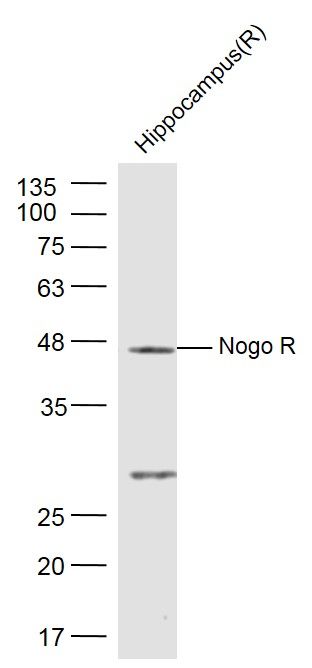 Sample: Sample:Hippocampus (Rat) Lysate at 40 ug Primary: Anti- Nogo R (bs-0129R) at 1/300 dilution Secondary: IRDye800CW Goat Anti-Rabbit IgG at 1/20000 dilution Predicted band size: 48 kD Observed band size: 48 kD 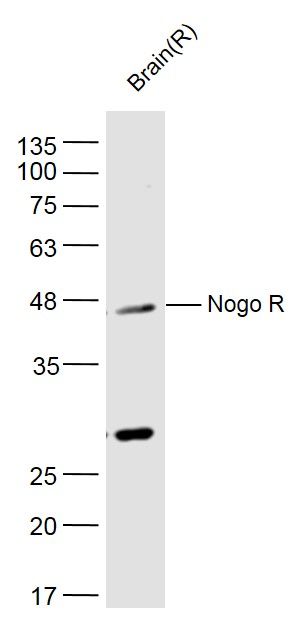 Sample: Sample:Brain (Rat) Lysate at 40 ug Primary: Anti- Nogo R (bs-0129R) at 1/300 dilution Secondary: IRDye800CW Goat Anti-Rabbit IgG at 1/20000 dilution Predicted band size: 48 kD Observed band size: 48 kD 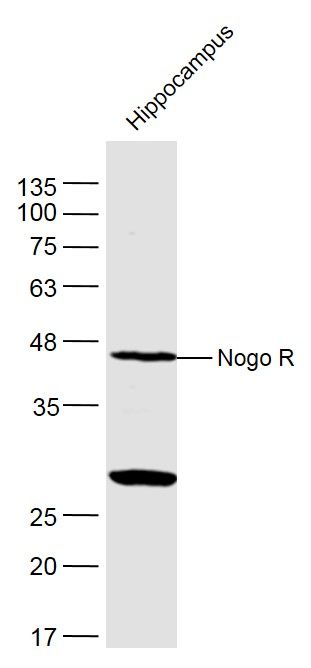 Sample: Sample:Hippocampus (Mouse) Lysate at 40 ug Primary: Anti- Nogo R (bs-0129R) at 1/300 dilution Secondary: IRDye800CW Goat Anti-Rabbit IgG at 1/20000 dilution Predicted band size: 48 kD Observed band size: 48 kD 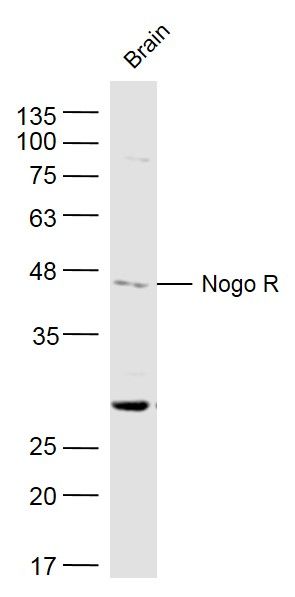 Sample: Sample:Brain (Mouse) Lysate at 40 ug Primary: Anti- Nogo R (bs-0129R) at 1/300 dilution Secondary: IRDye800CW Goat Anti-Rabbit IgG at 1/20000 dilution Predicted band size: 48 kD Observed band size: 48 kD Tissue/cell: rat brain tissue; 4% Paraformaldehyde-fixed and paraffin-embedded; Antigen retrieval: citrate buffer ( 0.01M, pH 6.0 ), Boiling bathing for 15min; Block endogenous peroxidase by 3% Hydrogen peroxide for 30min; Blocking buffer (normal goat serum,C-0005) at 37℃ for 20 min; Incubation: Anti-Nogo-R Polyclonal Antibody, Unconjugated(bs-0129R) 1:200, overnight at 4°C, followed by conjugation to the secondary antibody(SP-0023) and DAB(C-0010) staining |
我要詢價
*聯(lián)系方式:
(可以是QQ、MSN、電子郵箱、電話等,您的聯(lián)系方式不會被公開)
*內(nèi)容:


